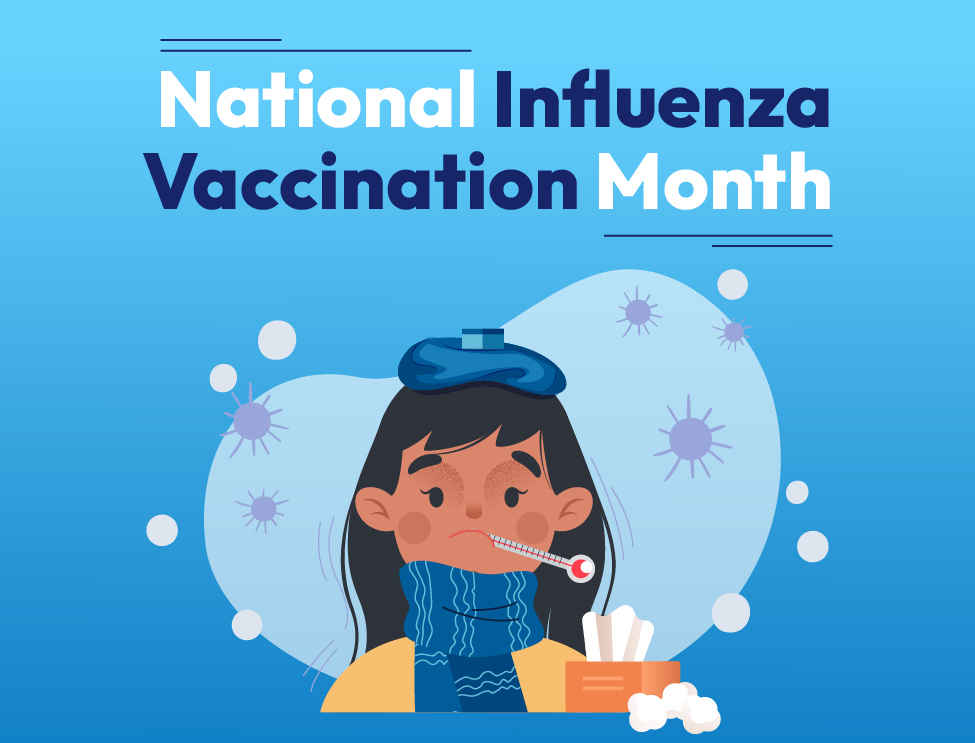It’s that time of year again! Time to stock up on soup, get a new comforter and, most importantly, time to get your flu vaccine. CDC recommends that everyone 6 months of age and older get a flu vaccine each year.
Influenza activity usually begins to increase in October and peaks between December and February. However, influenza activity can occur as late as May. Flu vaccines help protect against the main types of influenza viruses.
A fever, cough, sore throat, runny or stuffy nose, muscle pains, exhaustion, and miserable days spent in bed are the hallmarks of the flu for millions of individuals every season. Each year, the flu kills thousands to tens of thousands of people, sickens millions more, and sends hundreds of thousands to the hospital.
Types of Seasonal Influenza Viruses

Influenza viruses are classified into four types: A, B, C and D.
- Influenza A and B viruses circulate and cause seasonal epidemics of disease.
- Influenza C virus is detected less frequently and usually causes mild infections, thus does not present public health importance.
- Influenza D viruses primarily affect cattle and are not known to infect or cause illness in people.
Although there are many different influenza viruses, they are constantly changing and mutating. This is why it’s important to get vaccinated every year, as the composition of the flu vaccine is updated to match the circulating viruses.
Importance of getting Influenza Vaccine
Protect you from getting sick of flu
Prevents respiratory infections in pregnant women
Pregnant women are at a higher risk of developing respiratory infections, which can be dangerous for both the mother and the baby. The flu vaccine can protect pregnant women from contracting lung infections during and after their pregnancy. Studies have also shown that vaccination prevents the baby from getting sick for several months after birth. In addition, the flu vaccination can lessen the severity of an infection in pregnant women and may even prevent it from occurring altogether.
Preventive tool for people under chronic heart conditions
Flu vaccination is an important preventive tool for people with certain chronic health conditions. Flu vaccination can reduce the risk of a flu-related worsening of chronic lung disease (for example, chronic obstructive pulmonary disease (COPD) requiring hospitalization). Among people with diabetes and chronic lung disease, flu vaccination has been shown in separate studies to be associated with reduced hospitalizations from a worsening of their chronic condition.
In addition, research shows that flu vaccination has been associated with lower rates of some cardiac events among people with heart disease, especially among those who have had a cardiac event in the past year. Flu vaccination can also reduce the risk of a flu-related worsening of other health problems, such as Guillain-Barré Syndrome (GBS), an acute neurological syndrome characterized by weakness and paralysis.
How to observe the Influenza Vaccination Week
Given the necessity of the flu vaccine, you may be aware of the need to raise awareness about this life-threatening issue. Everyone is accountable for their fellow citizens, and everyone may disseminate knowledge whether they are at home or on the move. Here are several ways to commemorate Influenza Vaccination Week.
- Help spread the word using social media
Post a message on your social media accounts to educate your followers of the significance of flu vaccination. You can also inspire others and save lives by sharing your personal narrative.
- Volunteer at a vaccination drive
What could be a more appropriate way to observe vaccination week than to assist at a vaccination drive? Assist individuals in registering for vaccination slots, creating entertaining signs to direct them to vaccination sites, and reaching out to the needy.
- Participate in a Webinar Regarding Vaccination Promotion
It is always a pleasure to be cognizant of topics as important as the flu vaccine. You can participate in the webinars that the C.D.C. typically offers to promote vaccination week.
Final Verdict
In addition to having the flu vaccine, people should follow the same everyday precautions to prevent the spread of influenza, such as covering coughs, washing their hands frequently, and avoiding sick people. Antiviral medicines are an essential second line of defense in the treatment of influenza. These medications are not a substitute for immunization and require a prescription from a physician.
So if you haven’t gotten your flu vaccine yet, make sure to do so soon and keep up with the different flu preventive activities! It’s not too late!


